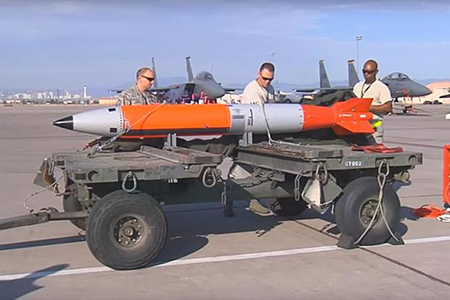"I find hope in the work of long-established groups such as the Arms Control Association...[and] I find hope in younger anti-nuclear activists and the movement around the world to formally ban the bomb."
UK Seeks to Boost Nuclear Capability
September 2025
By Shizuka Kuramitsu
The United Kingdom is rapidly bolstering its nuclear deterrent by strengthening its capabilities and ties with allies, including expanding nuclear cooperation with France, reintroducing the U.S. gravity nuclear bomb on its territory, and acquiring U.S.-made nuclear-capable aircraft.

On July 18, open-source researchers on social media, including OSINTDefender, identified flight activity strongly suggesting that the U.S. Air Force delivered a batch of U.S. B61-12 nuclear gravity bombs to a newly upgraded storage facility at the UK Royal Air Force base at Lakenheath for the first time since at least 2005.
The return of U.S. nuclear gravity bombs has been anticipated since at least April 2022, when the Federation of American Scientists released a report flagging future upgrades to a nuclear weapons storage site at Lakenheath in U.S. defense budget documents. In February 2024, the BBC reported upgrades to the Lakenheath facility.
“The U.S. Air Force used to store nuclear gravity bombs at Lakenheath, which in the 1990s was equipped with 33 underground storage vaults. By the early 2000s, there were a total of 110 B61 gravity bombs in the vaults for delivery by F-15E aircraft of the 48th Fighter Wing,” Hans Kristensen of the Federation of American Scientists wrote in 2022.
If return of B61-12 bombs to the UK “were to happen, it would break with decades of policy and planning and reverse the southern focus of the European nuclear deployment that emerged after the end of the Cold War,” Eliana Johns and Hans Kristensen wrote in February 2025.
“Even without weapons present, the addition of a large nuclear air base in northern Europe is a significant new development that would haven inconceivable just a decade-and-a-half ago,” they wrote.
This development follows the recent announcement of the UK-French nuclear coordination as well as the UK announcement about joining NATO’s air-based nuclear mission by purchasing U.S. F-35A nuclear-capable fighter jets, to be based at Royal Air Force base at Marham. (See ACT, July/August 2025.)
French President Emmanuel Macron and UK Prime Minister Keir Starmer issued a joint statement on nuclear policy and coordination July 10 following a three-day state visit by Macron to the UK. Referred to as the Northwood Declaration, the text states an intention to deepen coordination on French and UK nuclear responses to “extreme threats” to the European continent. Although the countries will maintain ultimate control over their own nuclear arsenals, they noted that their “nuclear forces are independent, but can be coordinated.”
The declaration also establishes an oversight committee to facilitate alignment, called Nuclear Supervisory Group, which is responsible for coordinating on “policies, capabilities, and operations,” according to the July 10 report by Le Monde.
The renewed cooperation agreement between the only two European nations in possession of nuclear arsenals since the 1995 Chequers Declaration demonstrates a noteworthy bolstering of Europe’s independent nuclear capabilities. “This will not affect in any way the core elements of their respective national nuclear doctrines,” Bruno Tertrais, deputy director of the French Foundation for Strategic Research, wrote July 10 on X. “But I believe it’s the optimal step [France and the UK] could take in the current context.”
